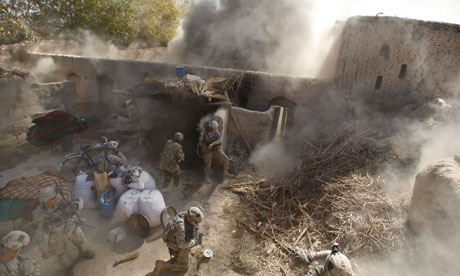Afghan Taliban leadership splintered by intense US military campaign
Locals say insurgent commanders have fled areas they used to control in Kandahar as Nato forces bolster operations

The US military onslaught against the Taliban in Kandahar has dealt a major blow against insurgent commanders who have been forced to flee areas they used to control and reduced two of the most senior insurgent field commanders to squabbling over footsoldiers, residents in the critically important southern province say.
Tribal elders and ordinary villagers living at the centre of Barack Obama's military surge in and around Kandahar city say it has severely damaged the Taliban's capability, with senior commanders and foreign fighters quitting the key districts of Zhari, Panjwai and Arghandab altogether.
Local fighters have been promoted to leadership positions and left to fend for themselves and continue attacks against coalition forces. But local people say that, cut off from their leaders, local Taliban have shied away from fighting.
"Two months ago the Taliban were everywhere," said Malim Juma Gul, a tribal elder from Zahri district. "They were attacking Nato forces every day and they were searching people and arresting anyone whom they suspected of working for the government. But after the big operations began, the commanders all ran away and the local fighters now just stay at home, or they work as day labourers and even on US cash-for-work schemes."
Zhari and other districts bordering Kandahar city have been the main targets of a major effort to quell the insurgency in the Taliban's home province of Kandahar.
US officials hope the upsurge in American troops and a huge increase in night raids targeting Taliban commanders will deal a devastating blow to the insurgency in the south and reverse its momentum countrywide.
Local people say such raids, which have been condemned by Afghan president Hamid Karzai, have made it extremely difficult for commanders to communicate with their men or even feel safe sheltering for the night.
Another tribal elder from neighbouring Panjwai who did want to be named said local fighters fled his village just a "few days" after their commanders and the non-Afghan fighters in the area quit.
The local Taliban apparently sought shelter in Kandahar city itself – a phenomenon that some observers fear could turn the largely rural insurgency into an urban one.
"The local Taliban can't fight, they are afraid of airstrikes," the Panjwai elder said. "We will see how Nato and the government responds to the needs of the people, but most of the people here like the Afghan army and are happy the Taliban are gone."
Another elder from the area said the rebels had only managed to dominate the area in the first place because of the inability of government forces to keep them out in the past. "I don't think the Taliban will resist foreign forces," he said. "If the Afghan army is present in the villages then the Taliban won't be able to plant mines, they won't be able to punish people for supporting the government."
Stories have also circulated that two of the south's top Taliban commanders, Mullah Qayoum Zakir and Mohammad Essa, have fallen out over how best to respond to the challenge from Nato.
A tribal chief from Helmand said Zakir, the Taliban official responsible for military operations in the south, had argued with Essa over footsoldiers – an increasingly scarce resource.
"Each man were trying to recruit more men to fight but both were losing men, especially Zakir, who lost eight fighters in one airstrike in Kajaki.
"Zakir asked Essa to give him some men but he refused," he said. Zakir's authority over his remaining footsoldiers was further diminished when he moved to Pakistan for safety, according to sources in Helmand and Kandahar.
One man from Kajaki with past links to Zakir said: "His men are saying, 'If you are staying in Pakistan with family but insisting we fight in this country then who will protect us? If we fight we should do so together, if not we should not fight.'"
But most analysts remain highly sceptical about Nato success stories, particularly after similar claims were made earlier in the year about operations in the Helmand town of Marjah that were later shown to be almost completely wrong.
Many argue that the Taliban are making a tactical retreat or returning to their sanctuaries in Pakistan to wait out the winter – views echoed by Qari Yousuf Ahmadi, the Taliban spokesman for the south.
American officials have appeared divided over the extent of progress. A National Intelligence Estimate presented to the US Congress reportedly painted a gloomy picture of the state of Afghanistan while a more up-to-date battle field assessments prepared by Petraeus's staff argued that progress was being made.
Even if Kandahar is only enjoying a temporary drop in Taliban activity, Nato believes it can use the winter months to bolster local security and prevent insurgents returning.
It is a view shared by some locals, including Malim Gul, the tribal elder from Zahri: "If the security forces hold these areas for longer we believe the Taliban won't come back. Local Taliban won't fight and will not be able to communicate easily if their commanders are away.
"I am sure local Taliban will eventually give up fighting if Nato and Afghan forces hold territories for longer."
==============================================
No comments:
Post a Comment